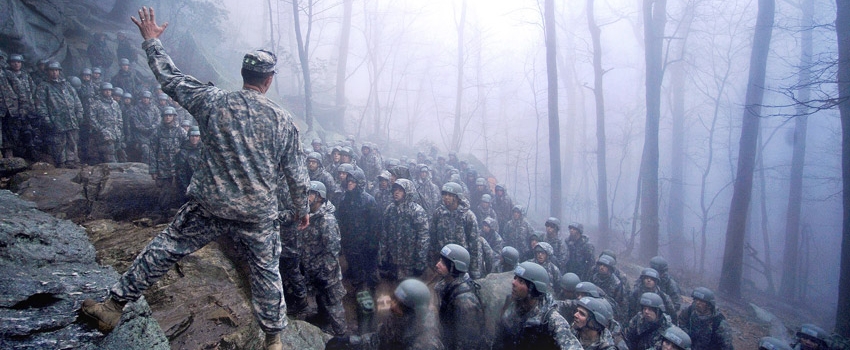
In my last blog post, we touched on how hypervigilance, a symptom of PTSD, is manifested in the brain. From our original metaphor, it is easy to see how a frog becomes comfortable in a pot of water set to boil. Ultimately, the frog succumbs to the heat and is not able to “get away” from the cause of its ultimate demise. Likewise, a warrior exposed to continuous combat begins to adapt to his or her hostile environment and ultimately becomes forever on-guard. As I mentioned at the end of the last post, “in the final piece of this 3 piece blog post, I hoped to impress upon you how large the issue of combat related stress currently is and how rampant the destructive emotional states associated with it are going to be in the not so distant future.” Ladies and gentlemen, submitted for your consideration, I’d like to suggest to you that the future is here!
In a study to determine whether neuropsychological changes occur following deployment into war zones, post-traumatic stress disorder appeared to be associated with attention deficits in soldiers one year after returning from Iraq, this; according to a report in the September 2009 issue of Archives of General Psychiatry. In addition, intense combat experiences were associated with faster reaction times regardless of how recently a soldier was deployed. Previous research has suggested that as soldiers face prolonged stressful and life-threatening situations, changes in their brains direct their cognitive (thinking, learning, and conscious memory) resources toward survival, according to background information in the article.
Knowing that the amygdala is involved in this survival reaction, it is easy to see why this change occurs so rapidly. For instance, warriors may respond to dangerous events more quickly while losing the ability to pay attention, learn, and remember events not related to combat. However, the authors write, "it remains unknown whether deployment-related neuropsychological changes persist over time, are associated with stress-related factors (e.g., combat intensity, PTSD symptoms and depressive reactions) or are better accounted for by demographic and contextual variables."
Brian P. Marx, Ph.D., from the Veterans Affairs Boston Healthcare System and Boston University School of Medicine, along with his colleagues, studied 268 male and female regular active-duty soldiers who served between 2003 and 2006. All the soldiers were given neuropsychological tests measuring response time, attention, and memory before and after deployment. A group of 164 was assessed both immediately and one year following their return, whereas a second group of 104 returned more recently and were assessed before deployment and then a median (midpoint) of 122 days after returning. The assessments also documented demographic and military information, risk factors for neuropsychological disorders and combat intensity and emotional distress.
"Dr. Marx writes, "greater PTSD symptoms were associated with poorer attention in soldiers tested at one-year follow-up but not in recently returned soldiers." He goes on to further state that the "greater the combat intensity, there was associated enhanced reaction time, irrespective of time since return." Neither depression nor risk-related variables such as alcohol use and head injury were associated with changes in neuropsychological functioning. With this in mind, it is understandable why my observations at the hotel noted higher levels of alertness.
Dr. Marx summarizes by saying, "recent findings reveal notably high rates of poor mental health outcomes among U.S. service members upon return from Iraq deployment. Our findings additionally highlight the neuropsychological consequences of chronic PTSD symptoms (ala hypervigilance). Although neuropsychological changes were not profound and, for reaction time, can be construed as desirable in the short term, their significance lies in the demonstration that psychiatric symptoms often reflect more extensive biological changes, including those affecting brain functioning." Bottom line here is again hypervigilance keeps you alive in battle, but it is a significant marker for future mental health problems.
This is more than a mental health problem, as the growing scientific literature demonstrates the significant impact of prolonged and repetitive stress on other health factors; like immune functioning, cardiovascular disease, and other systemic medical illnesses that can be traced to the biological stress response. Thus, subtle cognitive changes (positive or negative) associated with combat exposure or PTSD may represent a warning sign relevant to long-term health. This means that combat stress can be linked to a host of other disease states that have a higher mortality rate than PTSD.
This study highlights the effects of combat to the brain after 1 year's time; upon return from the battlefield. Is it too far fetched to think that repeated and longer combat tours are even more detrimental to our troops? The intent of this blog has never been to criticize or blame our warriors, their chain of command, or our government. SITREP: is intended to cast a brighter light onto the issue of stress related illnesses that are manifesting in our fighting forces, as this is a growing problem that will not just "go away." It will only get bigger and even more complex! That's not just my opinion, this is science staring us in the face.
Take Away
Conventional wisdom tells us that armed combat is a dangerous thing.
Yeah, we got that!
My concern is on what is lacking!
The wisdom that escapes us is not knowing what to do for those warriors close to us that we know are suffering in silence because they are concerned that seeking help will damage their career or will affect the disability rating they may be due as they are discharged.
My practice is designed specifically for today's warriors that are seeking an alternative solution to their suffering. All contact with Warrior Life Coach, LLC is completely confidential and your conversations will be held in the strictest of confidence. You can find me on the web at www.warriorlifecoach.com, on Twitter @warriorlfecoach, or become a Fan of Warrior Life Coach on Facebook. I am here for you! Join together and reach out!
Warrior, over!
| Attachment | Size |
|---|---|
| 108.72 KB |
